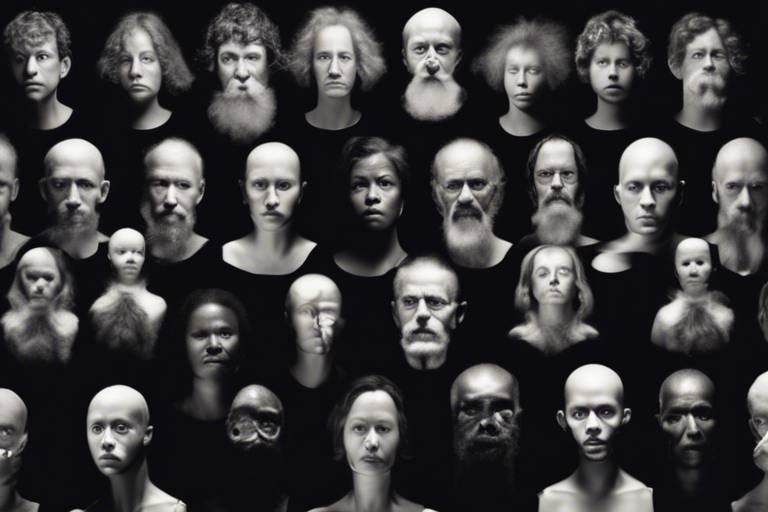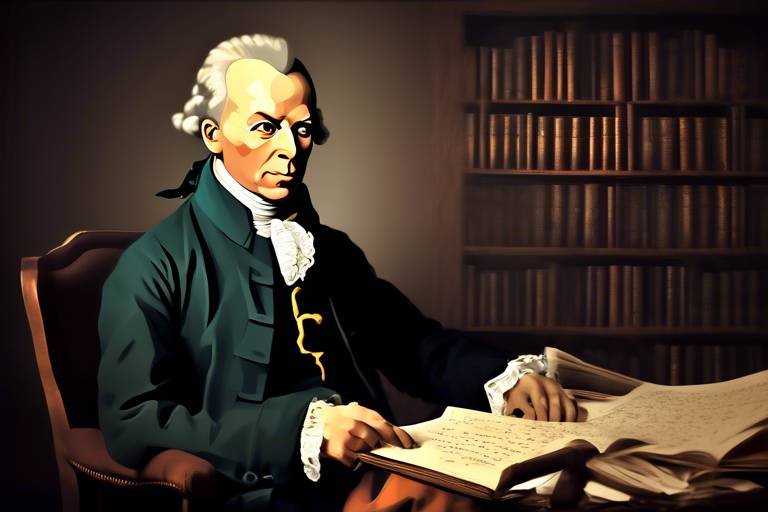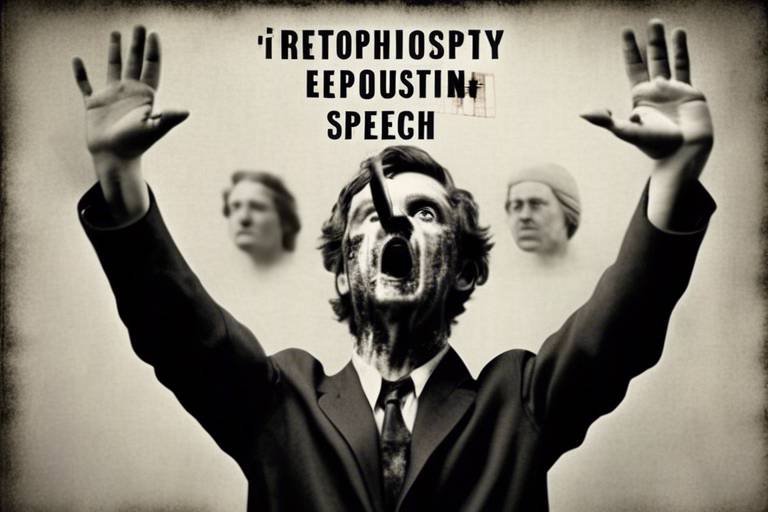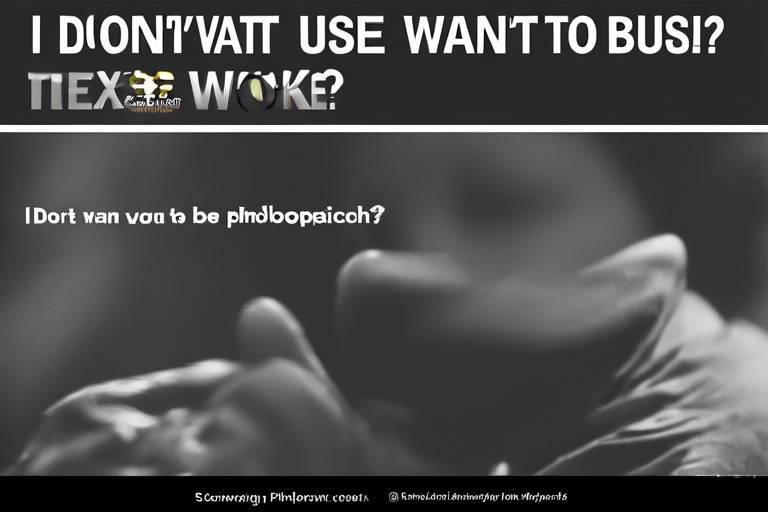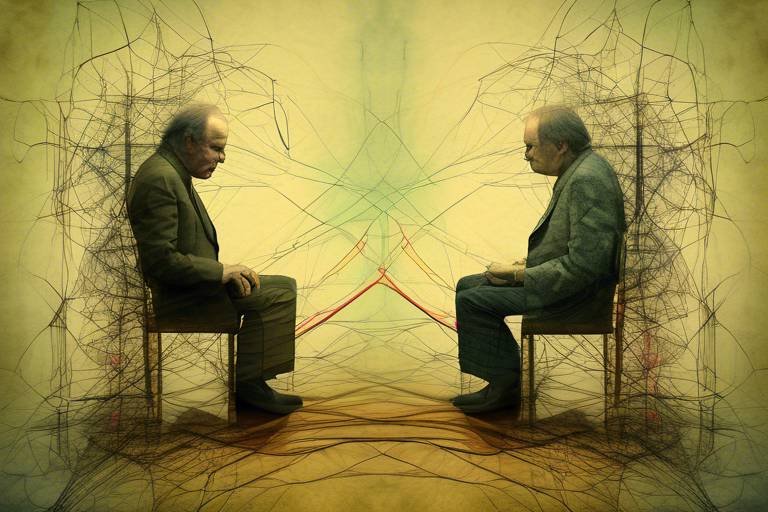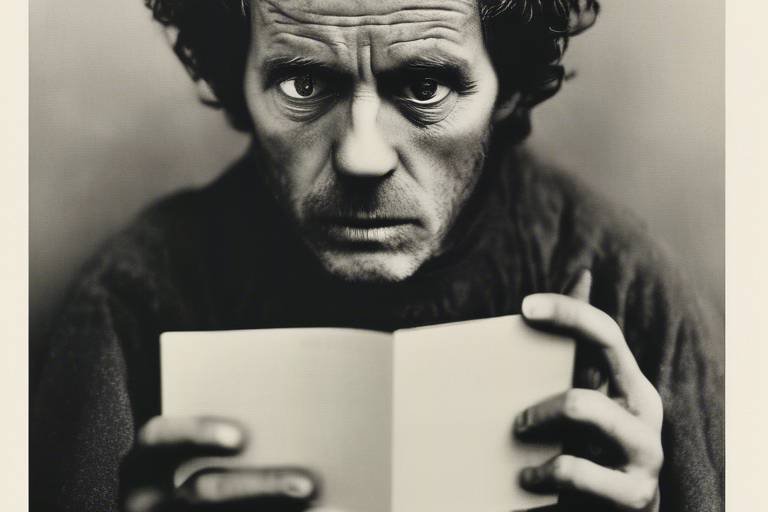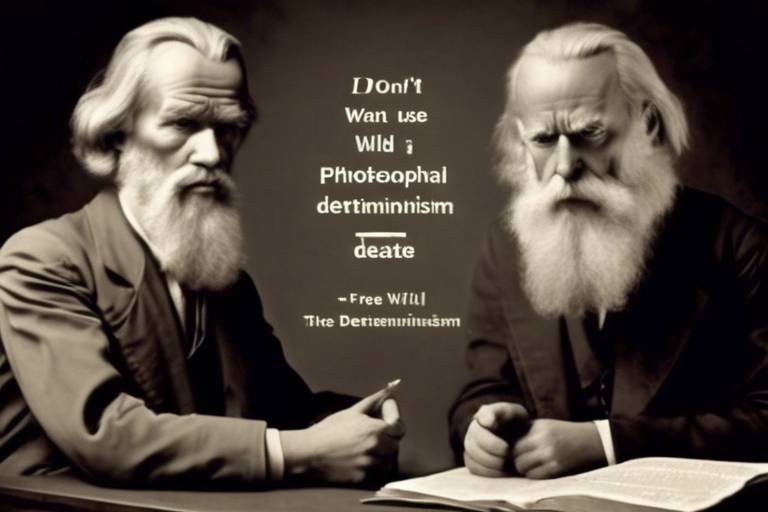Unpacking the Philosophical Concepts on Human Identity
In our quest to understand what it means to be human, we often stumble upon the intricate and profound concept of human identity. This exploration is not merely an academic exercise; it resonates deeply within our everyday lives, influencing how we perceive ourselves and interact with the world around us. Identity is like a tapestry, woven with threads of experience, memory, and social context, creating a unique picture that is constantly evolving. Philosophers have long pondered the essence of self, asking questions that echo through the ages: What makes us who we are? Is our identity static, or does it shift with time and circumstance? In this article, we will delve into various philosophical traditions and perspectives that shed light on these questions, examining the layers of identity that shape our existence.
The concept of self has been a focal point of philosophical inquiry for centuries. Thinkers from different backgrounds have offered diverse interpretations, leading to a rich tapestry of ideas. For instance, the ancient Greeks viewed the self as a unified essence, while existentialists like Jean-Paul Sartre argued that existence precedes essence, suggesting that we are defined by our actions and choices. This raises an intriguing question: Are we born with an inherent identity, or do we construct it through our experiences? The debate continues, with some philosophers emphasizing the importance of consciousness and self-awareness as pivotal to our understanding of self. This exploration of identity invites us to reflect on our personal narratives and the roles we play in the grand theater of life.
As we navigate through life, our sense of self is not a fixed entity; it is a dynamic process shaped by our experiences and memories. This section will explore how personal identity is maintained or transformed over time, focusing on the philosophical debates surrounding continuity and change. How do we remain the same person throughout our lives, despite the myriad changes we undergo? The answer lies in the intricate interplay between memory, experience, and our biological continuity.
Psychological continuity plays a crucial role in our understanding of identity. Our memories and experiences serve as the building blocks of who we are. They act as a bridge connecting our past selves with our present. Think about it: when you reminisce about a childhood event, you are not just recalling a memory; you are reconnecting with a part of your identity. This psychological thread is essential for maintaining a cohesive sense of self. However, the question remains: what happens when our memories are altered or lost? This brings us to a deeper examination of the relationship between memory and identity.
Memory is more than just a collection of past experiences; it is the lens through which we view our identity. Our recollections shape our self-perception, informing how we see ourselves and how we relate to others. Consider the impact of significant life events: they can transform our understanding of who we are. For instance, a graduation might instill a sense of accomplishment, while a loss could lead to a profound reevaluation of our priorities and beliefs. The fluidity of memory complicates our identity, raising philosophical questions about the essence of self. If our memories can change, can our identity also shift?
Traumatic experiences can have a profound effect on personal identity, often leading to a disintegration of one's sense of self. When faced with trauma, individuals may struggle to reconcile their past with their present, leading to feelings of confusion and alienation. This disruption raises important philosophical questions about recovery and reintegration. How do we rebuild our identity after such profound changes? The journey of healing often involves revisiting our memories and reconstructing our narrative, emphasizing the resilience of the human spirit.
While psychological continuity is vital, we must also consider the physical aspects of identity. Our bodies undergo constant change, from the aging process to injury and illness. This raises an intriguing question: is our biological continuity essential to our identity? Some philosophers argue that our physical form is integral to who we are, while others suggest that our identity transcends our physicality. This debate invites us to reflect on the relationship between our bodies and our sense of self, challenging us to consider what truly defines us.
Identity is not formed in isolation; it is deeply intertwined with our social contexts. Our cultural background, community, and relationships play a significant role in shaping our understanding of self. This section will explore how social identity influences our sense of belonging and our interactions with others. The way we see ourselves is often a reflection of the roles we occupy within our communities, highlighting the importance of social dynamics in identity formation.
Cultural contexts contribute significantly to our identity, shaping our beliefs, values, and social roles. From the traditions we inherit to the norms we adopt, culture acts as a powerful force in our identity formation. For example, consider how different cultures celebrate milestones like marriage or coming-of-age ceremonies. These rituals not only mark significant life events but also reinforce our sense of belonging and identity within a community. This cultural lens invites us to appreciate the diverse ways in which identity is constructed across different societies.
Language is another critical component in constructing our identity. It is through language that we express our thoughts, emotions, and experiences, shaping how we see ourselves and how others perceive us. Linguistic expression reflects our social interactions and self-concept, highlighting the profound impact of communication on our identity. For instance, the way we articulate our experiences can influence our self-perception and how we relate to others. As we navigate the complexities of identity, the role of language serves as a reminder of the interconnectedness of our personal and social selves.
- What is the essence of human identity? Human identity encompasses the psychological, physical, and social components that define who we are as individuals.
- How does memory affect our identity? Memory plays a crucial role in shaping our self-perception and continuity, connecting our past experiences with our present self.
- Can trauma change our identity? Yes, traumatic experiences can disrupt personal identity, leading to a reevaluation of self and necessitating a journey of healing and reintegration.
- Is our physical form essential to our identity? This is a debated topic; some argue that biological continuity is integral to identity, while others believe that identity transcends physicality.
- How do cultural influences shape our identity? Cultural contexts shape our beliefs, values, and social roles, significantly contributing to our understanding of self.

The Nature of Self
The concept of self is a fascinating and complex tapestry woven from various philosophical threads. At its core, the question arises: what does it truly mean to be an individual? Different thinkers throughout history have approached this question from myriad angles, each contributing to a rich dialogue that continues to evolve. For instance, ancient philosophers like Socrates emphasized the importance of self-knowledge, famously stating, "Know thyself." This idea suggests that understanding oneself is the foundation for a meaningful existence.
In contrast, modern philosophers have shifted the focus to more subjective interpretations of identity. Thinkers like Jean-Paul Sartre argued that existence precedes essence, positing that individuals are not born with a predetermined identity but rather create themselves through choices and actions. This existentialist view challenges us to consider how much control we have over our own identities. Are we merely products of our circumstances, or do we possess the agency to shape who we are?
Furthermore, the nature of self is often intertwined with the concept of consciousness. The famous philosopher René Descartes famously declared, "I think, therefore I am," highlighting the role of thought and awareness in establishing our identity. This leads us to ponder: is our self defined by our thoughts, or is there an underlying essence that persists regardless of our mental state? Such questions have prompted various philosophical inquiries into the layers of self, including the distinction between the mind and the body.
To further illustrate these ideas, consider the following table that summarizes key philosophical perspectives on the nature of self:
| Philosopher | Key Idea |
|---|---|
| Socrates | Self-knowledge is essential for a meaningful life. |
| Descartes | Consciousness is fundamental to the existence of self. |
| Sartre | Identity is created through choices and actions. |
| Locke | Memory and consciousness are crucial for personal identity. |
These diverse perspectives invite us to reflect on our own understanding of self. Are we defined by our memories, our thoughts, or our interactions with others? The interplay between these elements creates a dynamic and evolving sense of identity. Additionally, the nature of self is not solely an intellectual exercise; it has profound implications for how we navigate our lives and relate to those around us.
In a world where social media and global connectivity increasingly shape our self-perception, understanding the nature of self becomes even more critical. As we curate our online identities, we must ask ourselves: are we genuinely representing who we are, or are we merely constructing a facade? This question underscores the importance of authenticity in our personal journeys.
Ultimately, the nature of self is a multifaceted concept that invites ongoing exploration. By engaging with various philosophical perspectives, we can gain deeper insights into our identities and the forces that shape them. So, as you ponder your own sense of self, remember that it's a journey filled with questions, reflections, and perhaps even a bit of existential wonder.
- What is the philosophical definition of self? The self is often defined as the individual's consciousness and identity, shaped by thoughts, experiences, and social interactions.
- How do philosophers differ in their views on identity? Philosophers may emphasize different aspects, such as memory, consciousness, or social context, leading to varied interpretations of what constitutes personal identity.
- Can identity change over time? Yes, identity can evolve due to experiences, choices, and changes in social context, prompting ongoing philosophical debates about continuity and transformation.

Personal Identity Over Time
The concept of personal identity over time is a fascinating and complex topic in philosophy, one that has intrigued thinkers for centuries. At its core, it raises the question: What makes you, you? Is it the continuity of your memories, your physical body, or perhaps the relationships you cultivate throughout your life? As we journey through different stages of life, we accumulate experiences that shape our identity. However, as we change and grow, the essence of who we are can sometimes feel elusive, like trying to catch smoke with your bare hands.
Philosophers have long debated how we maintain our identity despite the inevitable changes we face. For instance, the idea of psychological continuity posits that our memories and experiences are crucial in defining our sense of self. Imagine your life as a tapestry, where each memory is a thread woven into the fabric of your identity. When you recall a pivotal moment, like graduating from college or a family vacation, you are not just remembering an event; you are reaffirming a part of yourself that has been shaped by those experiences.
Delving deeper into the psychological aspects of identity, we find that our memories play a significant role in how we perceive ourselves. They provide a narrative that connects our past with our present, forming a bridge that supports our identity over time. This continuity allows us to maintain a sense of self even when our circumstances change dramatically. For example, consider someone who moves to a new city. While their environment and social circles may shift, their memories and experiences remain intact, serving as a foundation upon which they can build a new identity.
Memory is not just a passive repository of experiences; it actively shapes our self-perception. Each recollection adds depth to our understanding of who we are. When we reminisce about our childhood or reflect on our accomplishments, we are essentially curating our identity. However, this relationship between memory and identity is not always straightforward. Memories can be unreliable, and as we age, the clarity of our recollections may fade. This raises a thought-provoking question: If our memories are distorted or forgotten, does that mean we lose a part of ourselves?
Trauma can significantly disrupt our personal identity, leading to profound changes in how we see ourselves. When we experience a traumatic event, it can shatter our sense of continuity and alter our self-perception. For instance, a person who has gone through a life-altering accident may struggle with feelings of loss and disconnection from their previous identity. This disruption prompts important philosophical questions about recovery and reintegration. How do we reclaim our identity after trauma? Is it possible to rebuild ourselves, or do we become entirely new individuals? These questions highlight the intricate relationship between trauma and the evolution of personal identity over time.
While psychological continuity is often emphasized, the physical aspect of identity cannot be overlooked. Our biological continuity raises intriguing questions about what it means to remain the same person throughout life. As our bodies change—through aging, illness, or even surgery—do we still retain our identity? Some philosophers argue that our physical form is integral to our identity, suggesting that significant changes to our body could lead to a fragmented sense of self. Others, however, contend that identity transcends the physical, rooted instead in our psychological experiences and memories.
Ultimately, the exploration of personal identity over time reveals a tapestry of interconnected threads—psychological, physical, and emotional. Each thread contributes to the rich fabric of who we are, reminding us that our identity is not a static entity but a dynamic, ever-evolving narrative. As we navigate the complexities of life, we must embrace the changes that come our way, recognizing that they are an integral part of our journey toward understanding ourselves.
- What is personal identity? Personal identity refers to the characteristics, memories, and experiences that make an individual unique over time.
- How do memories affect our identity? Memories shape our self-perception and provide continuity, connecting our past experiences to our present self.
- Can trauma change our identity? Yes, traumatic experiences can disrupt our sense of self, leading to significant changes in how we view ourselves.
- Is physical continuity important for identity? Some argue that physical continuity is essential, while others believe that psychological aspects are more significant.

Psychological Continuity
When we think about our identity, it's easy to see ourselves as a collection of memories and experiences. This idea of is crucial in understanding who we are over time. Imagine your life as a vast tapestry, each thread representing a memory or a significant event. Together, these threads weave the story of your identity, creating a rich and complex picture of you as an individual. But how do these memories contribute to our sense of self? Are we merely the sum of our experiences, or is there something deeper that binds us across time?
Philosophers like John Locke have argued that personal identity is fundamentally tied to consciousness and memory. Locke suggested that as long as we can remember past experiences, we maintain our identity. This raises fascinating questions: What happens when we forget? Does that mean we lose part of ourselves? Or consider the case of someone suffering from amnesia; their memories may be gone, but are they still the same person? These inquiries challenge us to think about the essence of our identity beyond just our recollections.
Moreover, our memories are not static; they evolve over time. Each time we recall an event, we may alter it slightly, influenced by our current emotions or subsequent experiences. This fluid nature of memory means that our identity is not only shaped by what we remember but also by how we interpret those memories. For instance, a childhood event that once brought joy might be viewed through a different lens as we grow older, perhaps reflecting regret or nostalgia. This transformation illustrates the dynamic interplay between memory and identity, suggesting that our sense of self is a living, breathing entity.
Another critical aspect of psychological continuity is the impact of trauma on personal identity. Traumatic experiences can significantly disrupt our memories and self-perception, leading to a fragmented sense of self. Individuals who have experienced trauma often grapple with questions like, "Who am I now?" or "Can I ever return to the person I was before?" Such disruptions can challenge the very foundation of psychological continuity, prompting philosophical discussions about recovery and reintegration. How do we reconstruct our identity after such profound changes? Is it possible to reclaim a sense of self that feels lost or altered?
In summary, psychological continuity is a fundamental aspect of our identity, intricately linked to our memories and experiences. As we navigate through life, our recollections shape our understanding of who we are, while the fluid nature of memory keeps our identity dynamic and evolving. The questions surrounding memory, trauma, and the essence of self remind us that identity is not just a fixed state but a journey of continuous discovery and reinvention.
- What is psychological continuity? Psychological continuity refers to the connection between our memories and experiences that shape our identity over time.
- Can we lose our identity if we forget our memories? While forgetting can impact our sense of self, many philosophers argue that identity is more complex and involves more than just memories.
- How does trauma affect our identity? Trauma can disrupt our memories and self-perception, leading to a fragmented sense of self and prompting questions about recovery and reintegration.

Memory and Identity
When we think about who we are, our memories play a pivotal role in shaping our identity. Imagine your life as a vast library filled with books, each representing a moment or experience that has contributed to the person you are today. Each memory is like a chapter in that library, telling a unique story that adds depth and richness to your identity. But how exactly do these memories influence our sense of self? Is it merely the recollection of past events, or is there something deeper at play?
Philosophers like John Locke have posited that personal identity is fundamentally tied to consciousness and memory. According to Locke, our memories are the threads that weave together our sense of self over time. If we can remember an experience, it becomes a part of who we are. This perspective raises intriguing questions: What happens if our memories fade or if we lose them entirely? Would we still be the same person? These questions lead us into the complex relationship between memory and identity, where the continuity of our self is challenged by the fragility of our recollections.
Moreover, the nature of memory itself is not static; it is often subject to distortion. Our memories can be influenced by emotions, societal narratives, and even the passage of time. This malleability can lead to a phenomenon known as memory reconstruction, where we inadvertently alter our memories based on new information or feelings. For instance, a traumatic event may be remembered vividly, yet the details surrounding it can shift over time, creating a dissonance between our lived experience and our current self-understanding. This fluctuation can lead to an existential crisis, prompting us to question: Am I still the same person if my memories are no longer reliable?
In addition to the philosophical implications, the psychological aspects of memory are equally significant. Our memories are not just passive records; they actively inform our decisions, behaviors, and interactions with others. Consider this: when you reminisce about a joyful moment, it can uplift your mood and influence your current actions. Conversely, recalling a painful memory might lead to feelings of sadness or anxiety. This interplay between memory and emotion underscores the idea that our identity is a dynamic construct, continuously shaped by our experiences and recollections.
Furthermore, the impact of memory on identity can be illustrated through various scenarios:
- Positive Memories: Recollections of achievements or happy times can enhance self-esteem and reinforce a positive self-image.
- Negative Memories: Traumatic experiences can lead to identity confusion or a fragmented sense of self, making it difficult for individuals to integrate those memories into their current identity.
- Collective Memories: Shared memories within a community can foster a sense of belonging and shape group identity, influencing how individuals perceive themselves in relation to others.
In conclusion, memory is not just a repository of the past; it is a living, breathing element of our identity. It molds our perceptions, informs our choices, and ultimately defines who we are as individuals. As we navigate through life, our memories will continue to evolve, challenging us to reflect on our past while shaping our future selves. The journey of understanding memory and identity is as intricate as the threads of our own personal narratives, intertwining and evolving with each new experience.
- How do memories shape our identity? Memories provide a narrative framework that helps us understand our past and how it influences our present self.
- What happens to our identity if we lose our memories? Losing memories can lead to a sense of disorientation and identity crisis, as our self-concept is often tied to our recollections.
- Can memories change over time? Yes, memories can be reconstructed and altered based on new experiences, emotions, and perspectives, which can affect our identity.

Impact of Trauma
Trauma can have a profound effect on our personal identity, often leading to a disconnection from who we once believed ourselves to be. When we experience a traumatic event, it’s as if a bomb has exploded in our lives, leaving behind a chaotic landscape where our sense of self can become fragmented. This disruption raises important philosophical questions about recovery and reintegration. How do we piece together the fragments of our identity after such a devastating experience? Can we ever return to our pre-trauma selves, or do we emerge transformed in ways we never anticipated?
As we navigate through the aftermath of trauma, we often find ourselves grappling with a new reality. The memories of the event can haunt us, reshaping our perceptions and altering our understanding of who we are. This leads us to question the very essence of our identity. Are we defined by our experiences, or do we have the power to redefine ourselves despite them? The philosophical inquiry into these questions is not just academic; it resonates deeply within our daily lives.
Moreover, trauma can lead to a significant shift in our relationships with others. When we undergo a traumatic experience, it’s not just our identity that changes; our social interactions can be affected as well. Friends and family might struggle to understand our new reality, which can lead to feelings of isolation. In this way, trauma creates a ripple effect, influencing not only the individual but also their community. The challenge lies in finding the support needed to navigate these changes while also working towards healing.
Furthermore, the impact of trauma can be categorized into several key areas:
- Emotional Disruption: Trauma often leads to a cascade of emotions, including anxiety, depression, and anger, which can cloud our sense of self.
- Memory Alteration: Traumatic experiences can distort our memories, making it difficult to reconcile who we were with who we are now.
- Identity Reconstruction: After trauma, individuals may engage in a process of reconstructing their identity, which can be both challenging and liberating.
In essence, trauma forces us to confront the complexities of our identity. It challenges us to explore the depths of our consciousness and to find meaning in our suffering. While the journey towards healing is often fraught with difficulties, it also offers the potential for profound personal growth. As we work through our trauma, we may discover new facets of ourselves that were previously hidden, leading to a richer, more nuanced understanding of our identity.
- What is the relationship between trauma and identity? Trauma can significantly alter an individual's sense of self, leading to a re-evaluation of one's identity and personal beliefs.
- Can trauma be overcome? Yes, while the journey can be challenging, many individuals find ways to heal and reconstruct their identity after trauma.
- How can I support someone dealing with trauma? Providing a listening ear, encouraging professional help, and being patient can greatly assist someone navigating their trauma.

Physical Continuity
When we think about our identity, we often imagine it as a continuous thread that weaves through our lives, connecting our past selves to our present and future. But what happens when we consider the physical aspect of this continuity? Is our identity tied to our physical form, or is it something deeper? This question has puzzled philosophers for centuries, leading to a rich tapestry of thought on the matter. The essence of our identity might seem anchored in our bodies, yet as we grow older, change, and even face physical challenges, our bodies undergo significant transformations. From the moment we are born until our final breath, our physical selves are in a constant state of flux. But does this mean our identity is also in flux?
To understand the relationship between physical continuity and identity, we can look at the concept of the "Ship of Theseus." This ancient thought experiment poses a fascinating dilemma: if you replace every single part of a ship, piece by piece, is it still the same ship? Similarly, if every cell in our body is replaced over time, are we still the same person? This question highlights the paradox of physical continuity. On one hand, we might argue that our biological makeup defines us; on the other hand, we can assert that our experiences and memories are what truly shape our identity.
Consider the following aspects of physical continuity:
- Biological Changes: Our bodies change due to aging, health issues, and lifestyle choices. These changes can affect how we perceive ourselves and how others perceive us.
- Identity and the Brain: The brain plays a crucial role in our identity. While our physical form may change, the continuity of our cognitive processes can maintain a sense of self.
- Philosophical Perspectives: Different philosophical traditions offer varied viewpoints on the significance of physical continuity. Some argue that our physical form is essential to our identity, while others believe that our thoughts and experiences are paramount.
As we navigate through life, our physical identity may be challenged by various factors, including illness or injury. Imagine a once-athletic individual who, after an accident, can no longer perform physical activities. This drastic change can lead to an identity crisis, as the person grapples with the loss of a significant part of themselves. Yet, it's essential to recognize that our identity is not solely defined by our physical capabilities; it encompasses our thoughts, emotions, and memories as well.
In conclusion, while physical continuity plays a vital role in our identity, it is merely one piece of a larger puzzle. Our identity is a complex interplay of physical, psychological, and social factors. As we continue to evolve, both physically and mentally, we must embrace the idea that our sense of self is resilient, capable of adapting to the inevitable changes life throws our way.
- What is physical continuity? Physical continuity refers to the idea that our identity is linked to our physical form and biological processes over time.
- How does aging affect our identity? Aging can lead to changes in our physical appearance and capabilities, which may impact how we perceive ourselves and how others see us.
- Is our identity solely tied to our memories? While memories play a crucial role in shaping our identity, other factors such as physical changes and social interactions also contribute significantly.
- Can trauma alter our sense of identity? Yes, traumatic experiences can disrupt our sense of self, leading to a reevaluation of our identity and how we relate to the world around us.
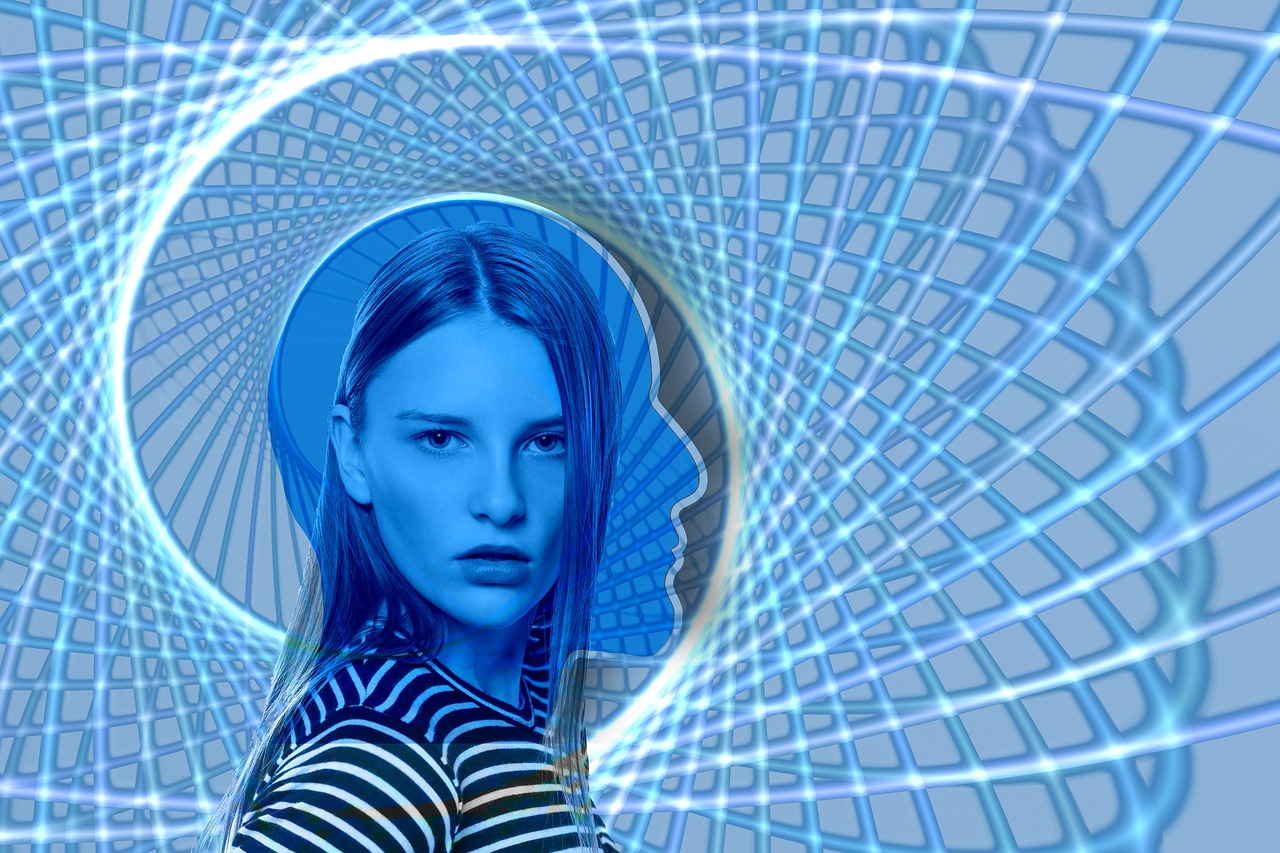
Social Identity and Its Implications
When we think about who we are, it’s impossible to ignore the impact of our social identity. This concept goes beyond just our individual traits; it encompasses the various groups we belong to, shaping our beliefs, values, and interactions. Imagine social identity as a colorful tapestry, where each thread represents a different aspect of our lives—our ethnicity, gender, profession, and even our hobbies. These threads intertwine to create a unique picture of our identity, influencing how we see ourselves and how the world perceives us.
Social identity is not just a backdrop; it plays a pivotal role in our everyday experiences. It affects our self-esteem, our sense of belonging, and even our decision-making processes. For instance, think about how your cultural background influences your views on family, education, and community. These elements are deeply ingrained in us, often without us even realizing it. As we navigate through life, we carry these influences with us, impacting our interactions and relationships.
Moreover, social identity can lead to both empowerment and marginalization. Being part of a community can provide a strong support system, fostering a sense of belonging that is essential for our mental well-being. However, it can also create divisions. For example, when we identify too strongly with one group, it can lead to an "us versus them" mentality, fostering stereotypes and prejudices. This duality raises important questions: How do we balance our social identities? How can we embrace our differences while promoting unity?
To further illustrate the implications of social identity, consider the following table that highlights the various components and their effects:
| Component of Social Identity | Impact |
|---|---|
| Ethnicity | Shapes cultural practices and values |
| Gender | Influences societal expectations and roles |
| Profession | Affects social status and self-perception |
| Hobbies | Creates communities and social networks |
Language also plays a crucial role in shaping our social identity. The way we communicate—our dialect, slang, and even body language—reflects our cultural background and can either connect us with others or create barriers. For instance, when we share a common language or jargon with a group, it fosters a sense of belonging. Conversely, unfamiliar language can alienate individuals, reinforcing feelings of exclusion.
In essence, our social identity is a dynamic and multifaceted construct that influences our interactions and perceptions. It is essential to recognize the power of social identity in shaping our experiences, as well as the importance of fostering inclusivity and understanding among diverse groups. By embracing our social identities while remaining open to others, we can create a more harmonious society where everyone feels valued and understood.
- What is social identity? Social identity refers to the way individuals define themselves in relation to groups they are part of, such as cultural, ethnic, or professional groups.
- How does social identity affect self-esteem? Social identity can significantly impact self-esteem; belonging to a supportive group can enhance self-worth, while marginalization can lead to feelings of inadequacy.
- Can social identity change over time? Yes, social identity is fluid and can evolve based on life experiences, personal growth, and changes in social circles.
- What role does language play in social identity? Language is a powerful tool for expressing and shaping social identity, influencing how individuals connect with others and how they are perceived within their communities.

Cultural Influences
Cultural influences play a pivotal role in shaping our identity, acting as the backdrop against which our lives unfold. Imagine your identity as a beautiful tapestry, each thread representing different aspects of your life woven together by the cultural context you inhabit. From the moment we are born, we are immersed in a rich environment of traditions, values, and social norms that mold our perceptions and behaviors. But how exactly do these cultural elements impact our sense of self? Let's dive deeper into this fascinating interplay.
At the heart of cultural influence is the notion that our beliefs and values are not formed in a vacuum; they are significantly shaped by the community and society around us. For instance, consider how different cultures have varying perspectives on concepts such as family, success, and morality. In collectivist societies, where community and familial ties are emphasized, individuals may derive their identity largely from their relationships and roles within the group. In contrast, individualistic cultures often prioritize personal achievements and self-expression, leading to a different understanding of identity. This dichotomy illustrates how culture can dictate the lens through which we view ourselves and our place in the world.
Moreover, cultural narratives and myths contribute to our identity formation. Stories passed down through generations serve as blueprints for understanding our roles and responsibilities within our communities. These narratives can instill a sense of belonging and purpose, influencing how we perceive ourselves. For example, the hero's journey archetype is prevalent in many cultures, encouraging individuals to see themselves as protagonists in their own life stories, facing challenges and growing through experiences.
Language, too, is a powerful cultural tool that shapes identity. It’s not just a means of communication but a vessel of cultural heritage and personal expression. The words we use can reflect our cultural affiliations and social standing, impacting how we relate to others and how they perceive us. For instance, bilingual individuals often find that they express different facets of their identity depending on the language they are using, highlighting the profound connection between language and self-perception.
In addition to these factors, the influence of globalization cannot be overlooked. As cultures interact and intermingle, individuals often find themselves navigating multiple identities. This can lead to a richer, more complex self-concept, but it can also create tensions as one reconciles differing cultural expectations. For example, a person raised in a traditional household may feel pressure to adhere to those values while simultaneously embracing modern, globalized perspectives. This interplay can lead to a dynamic and sometimes conflicting sense of identity.
In summary, cultural influences are integral to our understanding of identity. They shape our beliefs, values, and social roles, creating a unique framework through which we interpret our experiences. As we continue to explore the depths of human identity, it becomes clear that our cultural contexts are not merely background noise; they are the very fabric of who we are.
- How does culture influence personal identity? Culture shapes our beliefs, values, and social roles, which are essential components of our identity.
- Can identity change over time due to cultural influences? Yes, as cultures evolve and individuals interact with different cultural contexts, their identity can shift and adapt.
- What role does language play in identity formation? Language is a key factor in expressing and shaping our identity, reflecting cultural heritage and personal experiences.

Role of Language
Language is not just a tool for communication; it is the very fabric of our identity. Think about it: every word we speak, every sentence we construct, shapes how we perceive ourselves and how others perceive us. It's like a mirror reflecting our thoughts, beliefs, and experiences. When we express ourselves verbally, we are not merely relaying information; we are crafting a narrative that defines who we are. This narrative is deeply intertwined with our social interactions, cultural backgrounds, and personal histories.
Consider the impact of language on our social identity. Different languages carry distinct cultural nuances and values. For example, when someone speaks Spanish, they may invoke a sense of community and belonging that is tied to their heritage. Similarly, in English, the way we phrase our thoughts can reveal our social status, education level, and even our regional background. Language acts as a bridge that connects us to our roots, while also allowing us to navigate through various social landscapes.
Moreover, the role of language extends beyond mere words. It encompasses the dialects, slang, and idioms that we use. These linguistic choices can signify group membership or exclusion. For instance, the use of specific jargon within a profession not only establishes authority but also fosters a sense of belonging among peers. In this way, language becomes a tool for identity formation, influencing how we relate to ourselves and others.
But what happens when we encounter language barriers? These obstacles can create a disconnect between individuals and their communities, leading to feelings of isolation. For example, immigrants often struggle with language, which can hinder their ability to integrate into new societies. This challenge can impact their self-esteem and sense of identity, raising profound philosophical questions about belonging and the essence of self in a multicultural world.
In addition, the evolution of language itself reflects changes in societal norms and values. As new words and phrases emerge, they signal shifts in cultural attitudes. Take, for instance, the rise of terms related to gender identity and inclusivity. This linguistic evolution not only reflects societal changes but also shapes how individuals identify themselves. The language we use can empower or marginalize, making it a powerful force in the ongoing dialogue about identity.
In conclusion, the role of language in shaping identity is multifaceted and profound. It is a living, breathing entity that evolves with us, influencing our perceptions and interactions. As we navigate our lives, the words we choose and the languages we speak are not just means of communication; they are integral to the very essence of who we are.
- How does language influence our identity?
Language shapes our self-perception and plays a crucial role in how we relate to others and our communities. - Can language barriers affect personal identity?
Yes, language barriers can lead to feelings of isolation and hinder one's ability to integrate into new communities, impacting their sense of self. - What is the relationship between language and culture?
Language reflects cultural values and norms, and it is a key element in the formation of cultural identity.
Frequently Asked Questions
- What is the philosophical concept of self?
The philosophical concept of self refers to the understanding and interpretation of what it means to be an individual. It encompasses various perspectives from different thinkers who explore the essence of identity, consciousness, and the factors that contribute to our perception of ourselves.
- How does personal identity change over time?
Personal identity can change over time due to various factors such as experiences, memories, and even trauma. Philosophers debate how continuity is maintained despite these changes, questioning whether our identity is rooted in psychological continuity or physical continuity.
- What role do memories play in our identity?
Memories are crucial in shaping our identity as they provide a narrative of our past experiences. They help us connect with who we were and who we are now, influencing our self-perception and continuity over time.
- Can trauma affect one's sense of identity?
Yes, trauma can significantly disrupt personal identity. It may alter how individuals view themselves and their place in the world, leading to profound philosophical questions about recovery and the reintegration of a fractured sense of self.
- Is biological continuity essential to personal identity?
This is a debated topic in philosophy. Some argue that our biological continuity is a key component of our identity, while others believe that psychological factors, such as memories and experiences, are more critical in defining who we are.
- How does culture influence our identity?
Cultural contexts play a significant role in shaping our identity. They influence our beliefs, values, and social roles, helping to construct our self-concept as we navigate through various community dynamics.
- What is the importance of language in identity formation?
Language is vital in constructing identity as it reflects our social interactions and self-concept. The way we express ourselves through language can shape our identity and influence how we relate to others within our cultural and social frameworks.

